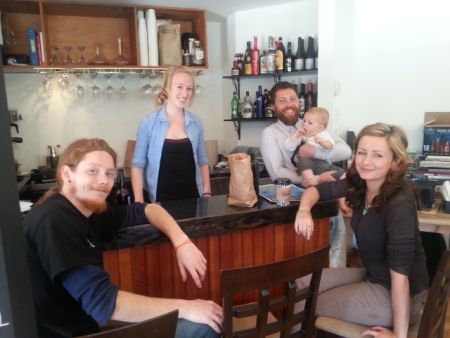SALT SPRING ISLAND—Board games form centerpieces on round wooden tables at The Gathering, a restaurant on Salt Spring Island in British Columbia. Opened in May 2013, the games-and-food restaurant is the first of its kind on the island. The establishment is also the first to pay 10 per cent of staff salaries in Salt Spring Dollars (SSD).
This latter initiative is the ticket to saving one of North America’s oldest and most successful community currencies. As alternative methods of payment, community currencies can take the place of national currencies, such as Canadian dollars, in some daily transactions. Since SSD’s launch 13 years ago, the multi-colored bills emblazoned with local heroes have inspired community currencies globally—modeling a path for depressed towns to reclaim their economies.
By design, community or alternative currencies, such as Toronto Dollars or Calgary Dollars, require people to spend at local participating shops, retaining more money in the community rather than having it float away to larger commercial centres. Printing one’s own method of payment is perfectly legal, as long as businesses using the currency disclose income and pay taxes.
Community currencies also serve as backup for a national currency in crisis. For instance, alternative currencies have woven through Greece in recent years as residents have struggled to adapt to the Euro. And in the wake of a collapsed peso, two million people in Argentina used alternative currencies and barter networks in 2002.
“We’re on the verge of an explosion in community currency globally, especially in other countries where people are suffering more,” said Michael Contardi, president of the non-profit Salt Spring Island Monetary Foundation (SSIMF) that administers SSD. Contardi receives frequent calls from communities the world over asking how to replicate the SSD system.
Although well-known, SSD have not gained as much traction in the Salt Spring community as was hoped. Founded as a tourism initiative, few people have adopted them for daily purchases on the island where millionaire homes line the seascape.
For a community currency to strengthen the local economy, it must circulate in the community like blood in a body. But on Salt Spring Island, SSDs are converted into Canadian dollars nearly as quickly as they’re taken out. The benefit to the local economy winds up being minimal and the SSIMF can’t store up a significant pool of funds to lend to local businesses, or donate to charities.
“We’re trying to discourage conversions, because conversions are the foil, the enemy, of community currencies. There’s always a trade-off between ease of convertibility and acceptance rates,” said Contardi.
The Gathering’s decision to pay some staff salaries in SSD keeps the currency flowing much more than a restaurant that accepts SSD from clients, and promptly converts the bills into Canadian dollars.
The concept was an easy sell to The Gathering’s owner, Bryan Dubien. The new restaurant’s opening is partially the result of an SSD 2,000 interest-free loan, the first loan the SSIMF has granted. Spending the currency locally on some salaries, food and alcohol fits right into Dubien’s community-minded ethos.
“We’re really committed to the local everything,” said Dubien. “ [SSD] is specifically invested in trying to make our local economy grow. And anything to keep spending money here is worthwhile. And if the extra tax to me is that I have to make more relationships in the community, and build up a better relationship with those that produce actual food, that’s a good tax to me.”
The additional 1,200 SSD per month that is estimated to be in circulation due to The Gathering’s staff salary payments is a huge boost to the currency, which currently sees 5,000 to 7,000 SSD purchased every month. Last year, before Contardi launched a five per cent tax on businesses for conversions and a five per cent charity donation for everyone who withdrew SSD from the brand new SSD ATM, purchases stood at SSD 2,000 per month.
Salt Spring Island’s strong economy, propped up by a reliable flock of summer tourists, may not need a community currency the way an economically depressed town might.
“We probably get more inquiries from people outside of Salt Spring, more interest from communities wanting to do what we’re doing, than we have interest internally, because people still have enough cash [here]. It’s not that scarce,” said Contardi.
But the problems facing community currencies are the same the world over, says Contardi.
“They adopted models that are similar to our old model, but it’s not going to be effective until you get out of the idea of conversions,” said Contardi. “You want the people to spend the money and you want the businesses to re-spend the money. You don’t want them to convert it back to Canadian dollars.”
For Dubien, at the end of the day, community currencies have one big advantage over national ones: accountability. Dubien can’t call up the National Bank of Canada to insist that banks maintain a safer debt-to-savings ratio. But he need only walk down the street to knock on Contardi’s door to express a concern about Salt Spring Dollars.
Alina Konevski is a journalist in the Fraser Valley.




